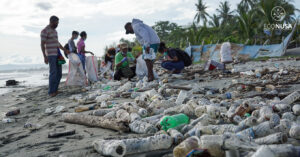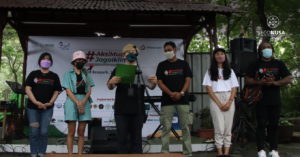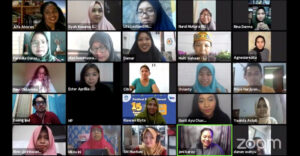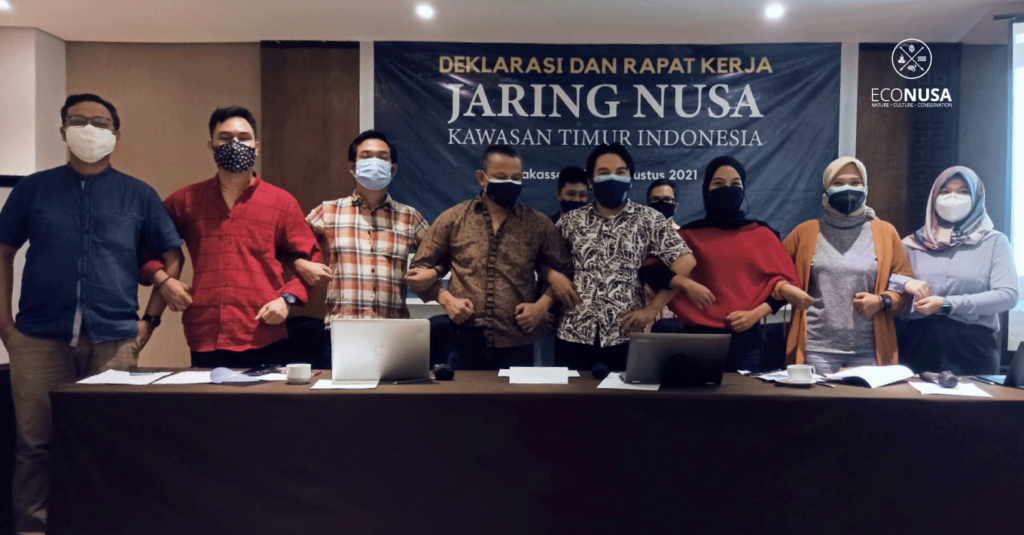
Fourteen civil society organizations in Eastern Indonesia declared its commitment to collaboratively save ocean, coasts, and small islands in eastern regions of Indonesia. In their declaration, Jaring Belajar Pesisir, Laut dan Pulau Kecil (literally “Learning Network for Coasts, Ocean and Small Island”) or so-called Jaring Nusa for Eastern Indonesia stated that coastal and small island communities in the Eastern Indonesia are vulnerable to various threats. “Jaring Nusa is a joint movement,” said Bustar Maitar, EcoNusa CEO, on the declaration at Four Points Hotel Makassar in South Sulawesi on Thursday 19 August 2021.
Those organizations engaging the Declaration of Jaring Nusa were Yayasan Ekosistim Nusantara Berkelanjutan (EcoNusa), Wahana Lingkungan Hidup Indonesia (WALHI) Nasional, WALHI South Sulawesi, WALHI North Maluku, Yayasan Hutan Biru, Yayasan Konservasi Laut Indonesia, Yayasan Bonebula, Yayasan PakaTiva, Moluccas Coastal Care, Tunas Bahari Maluku, Yayasan Tananua Flores, Yayasan Suara Nurani Minaesa (YSNM), Komdes Sultra, and Lembaga Pengembangan Sumberdaya Nelayan (LPSN).
Read Also: Now or Extinct, Not Late to Mitigate Climate Crisis
According to YSNM Director, Jull Takaliuang, Jaring Nusa will call the government to protect coasts and small islands that are on the brink of various challenges. Meanwhile, WALHI National Executive Manager, Ode Rakhman, said the government should declare the climate emergency given the fact that climate change has impacted particularly the small island communities. “They are deemed the most affected people due to climate change,” said Ode.
Small islands in Eastern Indonesia cope with various threats arising from climate change. For instances, coral bleaching, fishing season change, loss of coastal areas due to abrasion, and other perils due to the rising sea level. Threats also come from social aspect such as the declining income of coastal community, food security, conflict of catching areas, and the rising irresponsible fishing practices. There are also risks from political aspect. For instance, it is related to mining licenses at small islands which will eliminate local community. It happens to the controversial plan of gold mining in Sangihe, North Sulawesi.
Unfortunately, the government fails to pay serious attention to the conundrums at these small islands. The integrated spatial planning for coastal areas only happens to 11 regencies in 5 provinces as stipulated by the Law No. 27/2007 on Coastal and Small Islands Areas Management. Whereas, the law here has been enacted for more than a decade.
Besides, the puzzlement of mainland, coast and sea integrated management is proven by the Law No. 23/2014 on the Regional Government that generates various challenges on mainland, coast and sea and these only have technical solution. There is minimum public engagement during the development planning, management and maintenance.
Read Also: KORAL: Procurement of 2000 Boats in Biak Numfor and Tual Improper
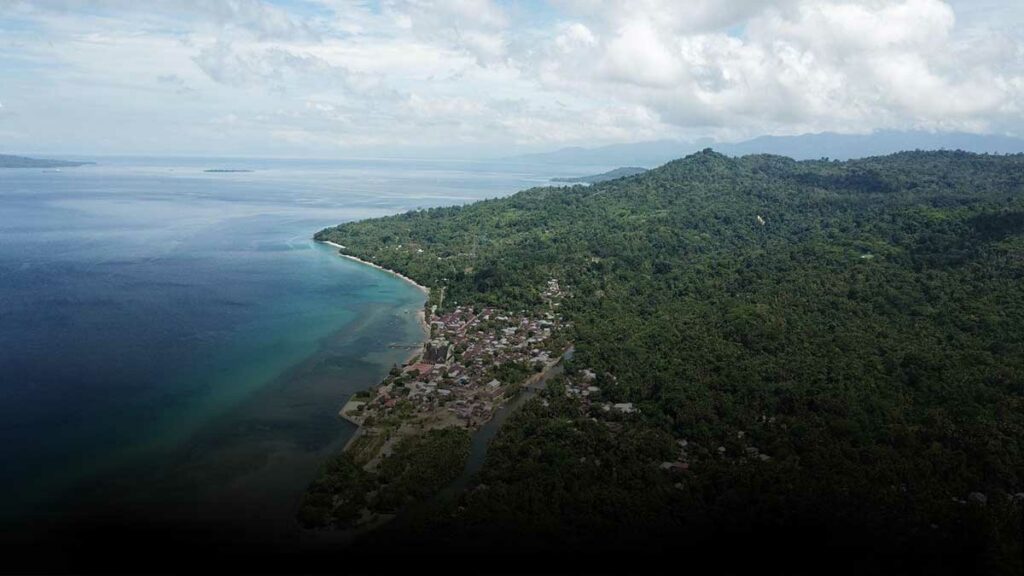
Jaring Nusa for Eastern Indonesia has declared the following standpoints:
- The facts of coastal and small island vulnerability in Eastern Indonesia to climate change, development and natural resources utilization require reinforcement for the community so as to be more resilient in mitigation and adaptation.
- The coastal and small island communities’ local and traditional adaptive ways to environment, social and economy need inventory and to be strengthened so that they become more resilient and inspire other communities to study.
- Community, community organization, civil society organization should learn each other, reinforce each other and act together to create security and resilience to the continuous change that threatens our coastal and small island areas.
- It is necessary to ensure and encourage coastal and small islands communities to involve actively in the Eastern Indonesia in all aspects of development planning and utilization of coastal and small island natural resources in such a way that their rights, access and control over their local resources are secured.
- It is necessary to reinforce and strengthen the resilience of coastal and small islands communities.
- To promote the making of national policy which ensures sustainability of coastal and small island areas.
Read Also: Pigo Kampoong, Kampoong in Concession Area
In addition to declaration and coordination meeting, there was also a webinar organized by Jaring Nusa for Eastern Indonesia and Ministry of Agrarian and Spatial Planning/National Land Agency. The event also presented Deputy Minister Surya Tjandra, WALHI National Executive Manager Ode Rakhman, and Hasanuddin University’s Dean of School of Law and agrarian expert Farida Patittingi as the keynote speakers. The webinar whose theme was “Agrarian Reform at Coastal and Small Island Areas: Root of Problem and Solution for Rights Protection could be accessed in here.
Editor: Nur Alfiyah & Leo Wahyudi


